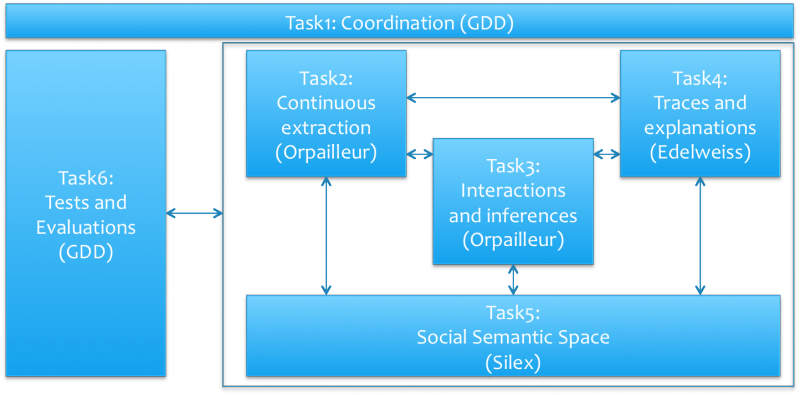ParticipantsFrom Kolflow Project(Difference between revisions)
Revision as of 13:13, 16 February 2011
GDD
Laboratory : LINA URL : http://www.lina.univ-nantes.fr/-ATLAS-GDD-.html Description : GDD is located at Laboratoire d'Informatique de Nantes Atlantique (LINA) and involves researchers from the University of Nantes working on data management, and distributed systems. GDD has currently 16 member : 8 permanents and 8 Phd students. Today's hard problems in data management go well beyond the traditional context of Database Management Systems (DBMS). These problems stem from significant evolutions of data, systems and applications. First, data have become much richer and more complex in terms of formats (e.g. multimedia objects), structures (e.g. semi-structured documents), content (e.g. incomplete or imprecise data), size (e.g. very large volumes), and associated semantics (e.g. metadata, code). The management of such data makes it hard to develop data-intensive applications and creates hard performance problems. Second, data management systems need to scale up to support large-distributed systems (such as the Internet or cluster systems) and deal with both fixed and mobile clients. In a highly distributed context, data sources are typically in high numbers, autonomous and heterogeneous, thereby making data integration difficult. Third, this combined evolution of data and systems gives rise to new, typically complex, applications with ubiquitous, on-line data access: virtual libraries, virtual stores, global catalogs, services for personal content management, services for mobile data management, etc.
Orpailleur
Laboratory : LORIA URL : http://www.loria.fr/research/equipes/orpailleur Description : Orpailleur is a joint research group of Henri Poincaré University Nancy 1, Nancy 2 University and INRIA Nancy - Grand Est. The Orpailleur team works on the integration of two complementary axes of knowledge-based systems:
This complementarity is pointed out by the desire to build working applications: these latters require knowledge (that can be extracted from data and texts, with the help of an analyst) and the manipulation of this knowledge is done thanks to inference engines. But this complementarity is not to be considered as a simple juxtaposition: one of the main issues of Orpailleur is to integrate KD and KRR principles, methods, and technologies. The project Kolflow goes in the same direction and adds collaborative and human-machine aspects. Orpailleur has been a partner of the network of excellence Knowledge Web, dealing with ontology technology, a partner of the “ACI Masse de données” dedicated to astronomy, and is a partner of the ANR Vigiterm about pharmacovigilance.
Silex
Laboratory : LIRIS URL : http://liris.cnrs.fr/silex Description : The goal of Silex team is to produce theories, formalisms, methods and tools integrating the intrinsically dynamic property of knowledge when used through open interactive human- digital environments, seen as co-learning systems. Two main domains organize this research: Trace Based Engineering and Enhanced Technology Human Learning. Researches on traced experience are developed according to two approaches: considering user activity traces within his/her interaction digital based framework as a support for effective reflexivity on temporal processes; considering annotations, documents structures and formal ontologies as dynamic knowledge inscriptions the user can exploit for personal knowledge management and explicit knowledge sharing.
Wimmics
Laboratory : INRIA URL : http://wimmics.inria.fr/ Description : The research fields of this team are graph-oriented knowledge representation, reasoning and operationalization to model and support actors, actions and interactions in web-based epistemic communities. Wimmics is a follow-up of the teams Acacia, Edelweiss and Kewi.
| ||||||||||||||||||||||||||||||||||||||||||||||||||||||||||||||||||||||||||||||||||||||||||||||||||||||||||||||||||||||||||||||||||||||||

